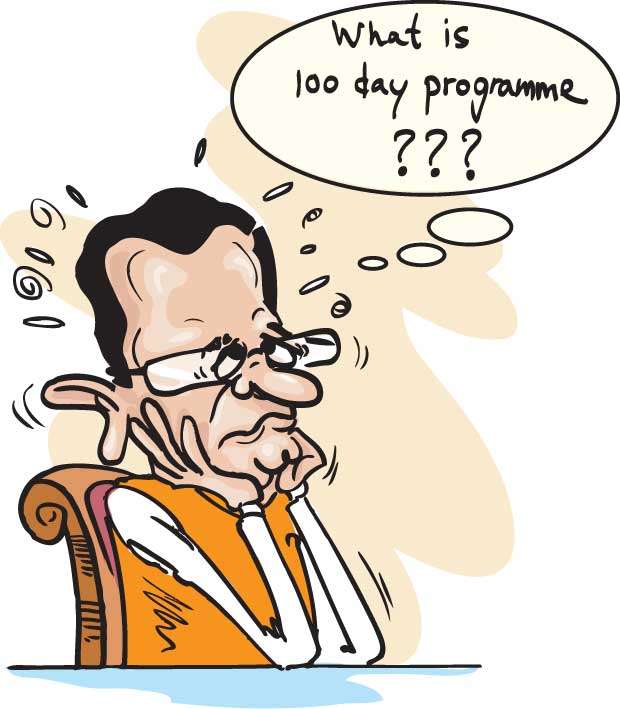Reply To:
Name - Reply Comment

Who would have thought President Maithripala Sirisena was not in agreement with the 100-day-programme marketed by those who toiled to see him as the President following the 2015 election? This has been the case, according to the President himself, who broke the news last week.
President Sirisena dumbfounded the entire country, perhaps including his family members, at a function held last Wednesday at the Sri Lanka Foundation to commemorate the 76th birth anniversary of the late Ven. Maduluwawe Sobitha Thera, when he questioned as to who compiled the 100-day-programme. He said with only 47 UNP MPs in Parliament, a programme was prepared in calendar form to be implemented within 100 days. He said the right thing that should have happened was to have dissolved Parliament the very next day he was sworn in.
He baffled the entire country by implying he was oblivious to the 100-day-programme. It is a well-known fact that the Presidential election campaign was purely planned and put in practice by the United National Party (UNP) leadership and therefore, there may be some truth in what the President says. The UNP might have strategized the course of action without the knowledge and consent of their common candidate, but in belief there was no reason for him to oppose it. And also the UNP, during its two tenures under Presidents of other parties, had been exercising the habit of bulldozing through the latter’s wishes and it might have ignored the President as he implies.
Yet, why did he wait for so long (three and a half years) to speak this “truth” to his countrymen? It is unlikely that people would believe what he said as the programme seemed to have had his blessings and the support of the SLFP group that paralyzed former President Mahinda Rajapaksa’s leadership along with him, throughout the 100 days when some of the 100 points of it were implemented. The President rightly boasted on Wednesday that it was he who gave necessary Parliamentary support as head of the SLFP to give effect to the main components of the 100-day-programme such as the mini-Budget with so many concessions to the people in the first month of his administration and the 19th Amendment which was passed in Parliament in April 2015. Did he mean support was given to implement a programme which he did not agree with?
The common Presidential candidate of the opposition, Maithripala Sirisena had announced on the first day of his candidature that he would appoint UNP leader Ranil Wickremesinghe as Prime Minister immediately after his election; he readily kept that promise. If he had not expected some programme – 100-day or else -- to be implemented in days to come, why did he appoint a Prime Minister and board of ministers without dissolving the Parliament straightaway?
One has to accept the important point he articulated about the role of the SLFP under his leadership in bringing in democratic reforms after the so-called Yahapalana Government came to power. There were 142 MPs who had accepted the leadership of former President Mahinda Rajapaksa then, and without their support no reforms could have been brought in by the UNP which had only 47 MPs. The President used his SLFP chairmanship to make his party members support those reforms. The fact that he is not only the SLFP Chairman but also the Executive President of the country might have worked towards this end.
However, his outburst points out that bickering between the UNP and the President’s group in the government is worsening. And neither party seems to be giving in which has already adversely affected the country. They have to put up with each other for the next 18 months as the law does not allow people to replace the incumbent government with another. Hence, circumstances demand leaders from both ruling parties to act responsibly.